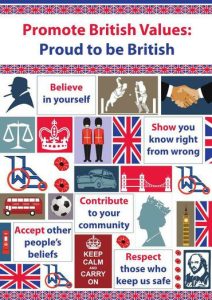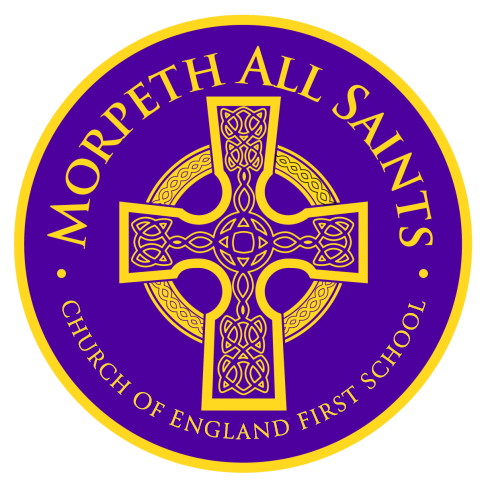Morpeth All Saints CE First School is committed to serving its community. It recognizes the multi-cultural, multi faith and ever-changing nature of the United Kingdom. However, it also understands the vital role it has in ensuring that groups or individuals within the school are not subjected to intimidation or radicalization by those wishing to unduly, or illegally, influence them. Morpeth All Saints CE First School also follows equal opportunities guidance which guarantees that there will be no discrimination against any individual or group, regardless of faith, ethnicity, gender, sexuality, political or financial status, or similar. Morpeth All Saints CE First School is dedicated to preparing students for their adult life beyond the formal examined curriculum and ensuring that it promotes and reinforces British values to all its students.
The Government emphasizes that schools are required to ensure that key ‘British Values’ are taught in all UK schools. The government set out its definition of British values in the 2011 Prevent Strategy.

Spiritual, Moral Social and Cultural Development (SMSCD)
At Morpeth All Saints Church of England First School our aim is that all “…pupils’ spiritual, moral, social and cultural development and, within this, the promotion of fundamental British Values, are at the heart of our school’s work” (Ofsted Framework 2016)
At Morpeth All Saints Church of England First School, we work hard to achieve this through “…thoughtful and wide-ranging promotion…” of SMSCD activities. Below are the objectives we wish for each pupil to achieve also examples of the planned opportunities that we provide at Morpeth All Saints Church of England First School to ensure our pupils become confident life-long learners.
British Values
The Department for Education reinforced the need “to create and enforce a clear and rigorous expectation on all schools to promote the fundamental British values of democracy, the rule of law, individual liberty and mutual respect and tolerance of those with different faiths and beliefs”
The government set out its definition of British Values in the 2011 Prevent Strategy to state the important role that British values play in education.
At Morpeth All Saints CE First School these values are reinforced regularly and in the following ways:
The Rule of Law:
 The importance of laws whether they are those that govern the class, the school or the country are clearly and consistently promoted and reinforced through our school rules and behaviour policy. During thinking skills activities, PHSE, RE, our use of the characteristics of effective learning and everyday school life pupils explore and discuss the fundamental concepts of justice, fairness, rewards, consequences and the importance of right and wrong. Our pupils are also taught the reasons behind laws that govern and protect us during visits from authorities such as the Community Police Officers, Fire Service etc. and are regular parts of our calendar and help reinforce this message.
The importance of laws whether they are those that govern the class, the school or the country are clearly and consistently promoted and reinforced through our school rules and behaviour policy. During thinking skills activities, PHSE, RE, our use of the characteristics of effective learning and everyday school life pupils explore and discuss the fundamental concepts of justice, fairness, rewards, consequences and the importance of right and wrong. Our pupils are also taught the reasons behind laws that govern and protect us during visits from authorities such as the Community Police Officers, Fire Service etc. and are regular parts of our calendar and help reinforce this message.
Individual Liberty:
 Within school, pupils are actively encouraged to make choices, knowing they are in a safe and supportive environment. Pupils have a range of key roles and responsibilities across the school and they are actively encouraged to make choices. In the EYFS, pupils lead their own curriculum and make decisions within a continuous provision which is child-led. We aim to empower all pupils to make their own decisions confidently, such decisions could be demonstrated as a choice of challenge in the classroom; for example, choosing more tricky activities, creating their own next step or presenting their own views in a thinking skills activity. Pupils are encouraged to know and understand their rights and personal freedoms and advised on how to exercise these safely through for example e-safety and PSHE lessons. It could also be demonstrated through participation; for example, in numerous extra-curricular clubs, the school or sports council, pupil voice questionnaires and worship reviews that we aim to provide clear and consistent boundaries which enables pupils have the freedom to explore moral ideas and make their own decisions and choices.
Within school, pupils are actively encouraged to make choices, knowing they are in a safe and supportive environment. Pupils have a range of key roles and responsibilities across the school and they are actively encouraged to make choices. In the EYFS, pupils lead their own curriculum and make decisions within a continuous provision which is child-led. We aim to empower all pupils to make their own decisions confidently, such decisions could be demonstrated as a choice of challenge in the classroom; for example, choosing more tricky activities, creating their own next step or presenting their own views in a thinking skills activity. Pupils are encouraged to know and understand their rights and personal freedoms and advised on how to exercise these safely through for example e-safety and PSHE lessons. It could also be demonstrated through participation; for example, in numerous extra-curricular clubs, the school or sports council, pupil voice questionnaires and worship reviews that we aim to provide clear and consistent boundaries which enables pupils have the freedom to explore moral ideas and make their own decisions and choices.
Mutual Respect:
 As one of our Christian Values, respect is at the heart of our ethos and is embedded in our curriculum and everything we do in school. At Morpeth All Saints we have a mixture of faiths, religions and cultures and all pupils work and play together with ‘Love and Laughter’ demonstrating a mutual respect for each other. In our daily worships, pupils participate in discussions and explore the meaning of our Christian values. Respect is also modelled and promoted by all staff in school and throughout projects which we run, for example, birthday celebrations for the Queen, our outdoor murals and working closely with Northumberland Sports Partnership. We also share the importance of this value with home and the community through newsletters, church magazines, and the school website.
As one of our Christian Values, respect is at the heart of our ethos and is embedded in our curriculum and everything we do in school. At Morpeth All Saints we have a mixture of faiths, religions and cultures and all pupils work and play together with ‘Love and Laughter’ demonstrating a mutual respect for each other. In our daily worships, pupils participate in discussions and explore the meaning of our Christian values. Respect is also modelled and promoted by all staff in school and throughout projects which we run, for example, birthday celebrations for the Queen, our outdoor murals and working closely with Northumberland Sports Partnership. We also share the importance of this value with home and the community through newsletters, church magazines, and the school website.
Tolerance of those of Different Faiths and Beliefs:
 At Morpeth All Saints our RE and PHSE curriculum aims to deepen pupils’ understanding of faith, religion and culture around the world and celebrate cultural diversity. We also recognise the importance of first-hand experiences and so regularly plan opportunities for members of different faiths and religions to share their knowledge and enhance our learning.
At Morpeth All Saints our RE and PHSE curriculum aims to deepen pupils’ understanding of faith, religion and culture around the world and celebrate cultural diversity. We also recognise the importance of first-hand experiences and so regularly plan opportunities for members of different faiths and religions to share their knowledge and enhance our learning.
Democracy
 Democracy is embedded throughout our school curriculum and we actively promote a rights-respecting environment where all pupils and staff respect the rights of each other and listen carefully to others’ voices and opinions. As part of our PHSE and Thinking Skills curriculum pupils learn about the ideas of democracy in a variety of ways, for example, the School and Sports Council. As part of the meetings, both councils work together and follow a clearly democratic structure for discussion, debate and voting. We embody equality, fairness and a right to pupil voice as part of our school ethos. Pupils are regularly asked to complete questionnaires providing their views on PE, The Characteristics of Effective Learning, Religious Education, E-Safety, intervention groups and how pupils feel in school. Practitioners then use this information to inform future projects and develop provision further.
Democracy is embedded throughout our school curriculum and we actively promote a rights-respecting environment where all pupils and staff respect the rights of each other and listen carefully to others’ voices and opinions. As part of our PHSE and Thinking Skills curriculum pupils learn about the ideas of democracy in a variety of ways, for example, the School and Sports Council. As part of the meetings, both councils work together and follow a clearly democratic structure for discussion, debate and voting. We embody equality, fairness and a right to pupil voice as part of our school ethos. Pupils are regularly asked to complete questionnaires providing their views on PE, The Characteristics of Effective Learning, Religious Education, E-Safety, intervention groups and how pupils feel in school. Practitioners then use this information to inform future projects and develop provision further.
Child Protection and Tackling Extremism Radicalisation Prevent
 Something which is clearly not part of any British or European value is extremism. It is important to remember that whilst the threat from the so-called Islamic State has been a focus of the Counter Terrorism and Security Act, the Prevent Duty is clear that extremism of all kinds should be tackled too. In England, far-right groups such as Britain First and the English Defence League need to be tackled, too. Extremism is not a new topic in education, but schools have a relatively new statutory duty to pay “due regard to the need to prevent people from being drawn into terrorism”. All adults working at Morpeth All Saints are aware of their responsibility to safeguard and promote the welfare of every pupil, both physical and emotional, inside and outside school. This involves ensuring that pupils are protected from significant physical or emotional harm and that there is a positive commitment to ensure the satisfactory development and growth of the individual. Every member of staff recognises that safeguarding against radicalisation and extremism is no different to safeguarding against any other vulnerability in today’s society. The Tackling Extremism and Radicalisation Policy sets out our beliefs, strategies and procedures to protect vulnerable individuals from being radicalised or exposed to extremist views, by identifying who they are and promptly providing them with support.
Something which is clearly not part of any British or European value is extremism. It is important to remember that whilst the threat from the so-called Islamic State has been a focus of the Counter Terrorism and Security Act, the Prevent Duty is clear that extremism of all kinds should be tackled too. In England, far-right groups such as Britain First and the English Defence League need to be tackled, too. Extremism is not a new topic in education, but schools have a relatively new statutory duty to pay “due regard to the need to prevent people from being drawn into terrorism”. All adults working at Morpeth All Saints are aware of their responsibility to safeguard and promote the welfare of every pupil, both physical and emotional, inside and outside school. This involves ensuring that pupils are protected from significant physical or emotional harm and that there is a positive commitment to ensure the satisfactory development and growth of the individual. Every member of staff recognises that safeguarding against radicalisation and extremism is no different to safeguarding against any other vulnerability in today’s society. The Tackling Extremism and Radicalisation Policy sets out our beliefs, strategies and procedures to protect vulnerable individuals from being radicalised or exposed to extremist views, by identifying who they are and promptly providing them with support.
- Raise awareness of safeguarding issues and equip children with the skills needed to keep them safe.
- Implement procedures for identifying and reporting cases, or suspected cases, of abuse.
National Citizen Service Act 2017
The National Citizen Service Trust was given Royal Charter status following the passage of this particular piece of legislation, meaning that the National Citizen Service has now been placed on a statutory footing. Previously, this would have been bigger news for the education sector, with schools and academies forced to promote the service during school assemblies; however, following the removal of this requirement in February 2017, the direct impact on schools has been lessened.
Nevertheless, the National Citizen Service Trust is required to promote its programmes in schools and other educational institutions.



